In the middle of September, the almond harvest is in full swing. Just a few years ago, this small nut had completely disappeared from the French agricultural landscape, but it is now gradually regaining ground to meet the demand from a rapidly expanding market. François Moulias, managing director of La Compagnie des Amandes, takes a look at the development of this growing sector and the opportunities it offers.
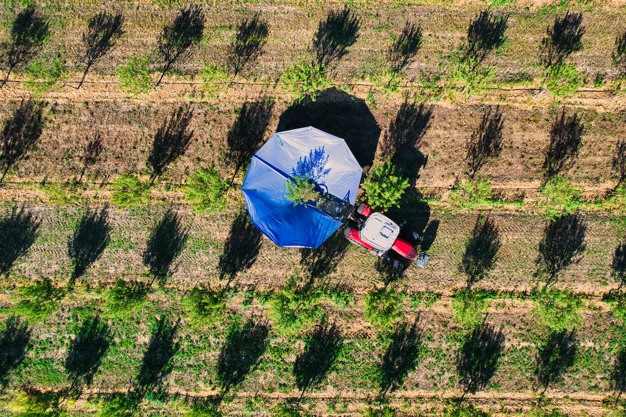 Harvesting almonds - Photo credit: La Compagnie des Amandes
Harvesting almonds - Photo credit: La Compagnie des Amandes

Low French supply on a highly diversified market
Today, the French consume more than 40,000 tons of almonds a year, while French production is around 1,700 tons. There is therefore huge potential for development. "The French almond orchards currently cover 2,300 hectares. When maturity is reached at the end of the sixth year, it will represent a potential harvest of 2,300 tons. French supply is small, on a highly diversified market."
Almonds meet the expectations of "healthy snacking", a fast-growing consumer trend. But they are also used in a number of sectors, including processing, pastry-making (almond paste), confectionery (calissons...), beverages, chocolate-manufacturing (praliné) and the cosmetics industry, "a huge market that appreciates the virtues of almonds, known since Antiquity." The current debate about the possibility of replacing animal proteins with plant proteins also plays a role in the development of this growing market. "Almond proteins are particularly rich and could be a very interesting alternative, especially for the cheese manufacturing sector."
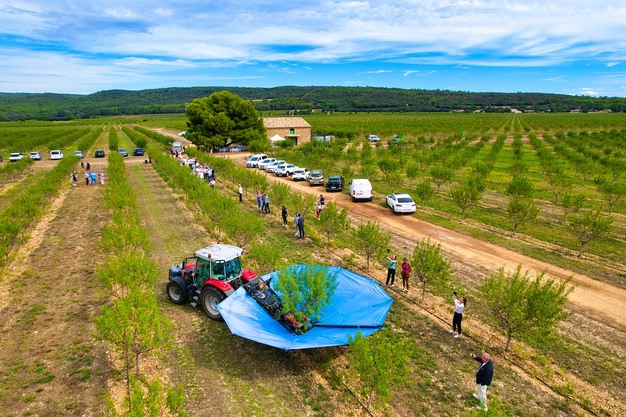
Photo credit: La Compagnie des Amandes
High-quality French almonds to stand out on highly concentrated market
While the global almond market is currently highly concentrated, La Compagnie des Amandes is seeking to create a French sector that will shine by its quality and its commitment to eco-responsibility. "Almond growing is one of the most concentrated sectors in the world. California accounts for 80% of the global production, Australia accounts for a small 10%, and the rest is shared between the other countries of the world. France's production is therefore anecdotal on a global scale when compared with the biggest European producers: Spain, Italy, Greece and Portugal. As always, our weak point is the cost price, which is well above average. Our French almonds are sold at around 13 euros [14.5 USD] per kilo, when you can easily find them on the market for 5 euros [5.6 USD]. But guaranteeing a quality product with a much better carbon footprint than Californian almonds enables us to position our almonds on the premium market and attract clients who are sensitive to these values."
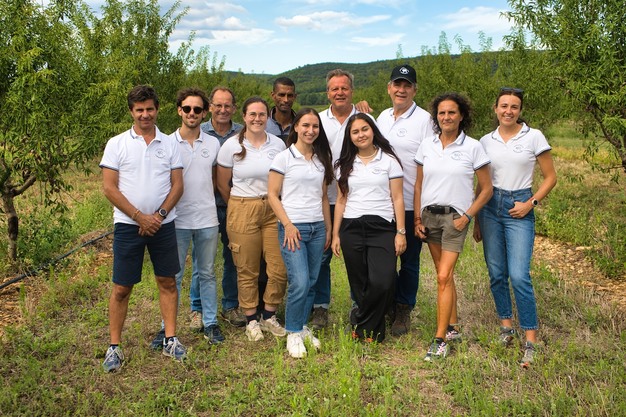 Photo credit: La Compagnie des Amandes
Photo credit: La Compagnie des Amandes
An entire sector to build and organize
Developing this sector, which did not exist until 2018, and structuring the French supply is the challenge set by La Compagnie des Amandes, which combines production, trading and processing activities. "It is a great challenge, because there are few sectors to date that are built from scratch. We are the biggest almond growers in France, with 210 hectares of orchards, given that there are 1,032 almond growers in the country covering 2,300 hectares (an average of 2.5 hectares per grower). This production activity gives us very strong legitimacy with farmers and clients. But we also have a trading activity, buying the production of all these small farms. We aggregate their supply so that they conform to a quality and traceability plan for sales. Lastly, we have a processing business, with a factory currently under construction where the almonds will be broken under traceability and quality conditions that comply with French certifications and requirements. The idea is to serve as an exit point for producers in the sector and an entry point for buyers."
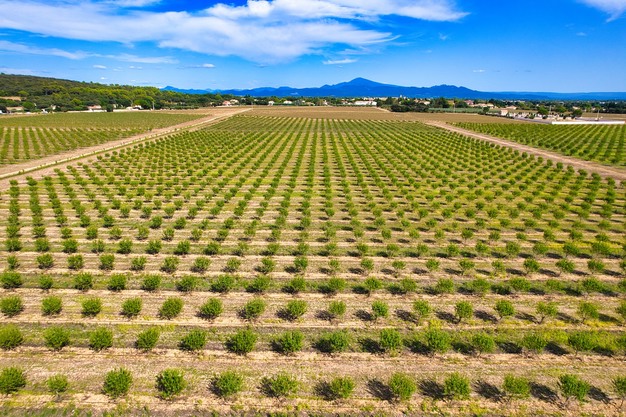
Photo credit: La Compagnie des Amandes
Major agronomic advantages
The French almond sector is still in its infancy, but almonds are an endemic product of the south of France. "Much like the olive tree, the almond tree is typical of the south, but its cultivation was lost to imports. Today, we want to raise awareness of the major advantages of this crop. It is an extremely hardy tree, and very easy to manage in an orchard compared with other fruit crops. By way of comparison, the apple tree requires five times more treatment than the almond tree, whose fruit is naturally protected by its shell. It costs €12,000 to €15,000/hectare [13,399 to 16,749 USD/hectare] to develop when planted. One hectare of apple trees costs between €50,000 and €80,000 [55,829 and 89,327 USD]. It also takes 80 hours of work per hectare, which is very economical in terms of time spent. For many farmers, growing almonds is an interesting way of diversifying their activities, particularly in the context of the wine-growing crisis that is affecting the southern regions of France in particular. Another major advantage over other tree crops is that the almond tree consumes very little water - half as much as an apricot or peach tree.
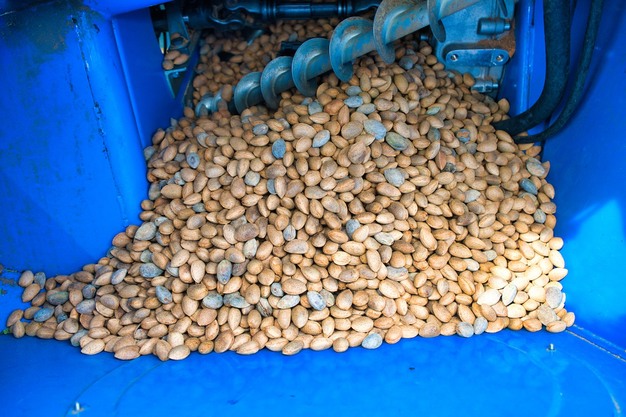
Photo credit: La Compagnie des Amandes
500 hectares under possible conversion in the next few years
Given these advantages, the sector has been attracting interest. "A lot of farmers have contacted us for information on almond production. At the moment, we are in discussions with various producers about planting a total of 500 hectares. As far as we are concerned, we will be doubling the size of our orchards over the next few years.
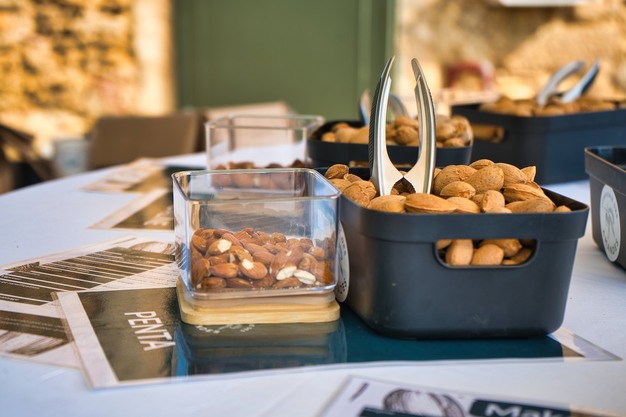
Penta variety - Photo credit: La Compagnie des Amandes
According to François Moulias, the low standards required to grow almonds and the wide range of uses for the fruit in the face of ever-increasing consumption clearly indicate that this is a promising market. "There are markets where consumption is structurally falling, but in the case of almonds, it is rising. Today, we have more clients than supply, which is quite a rare occurrence in the agricultural world, so I am very calm about the future of the sector."
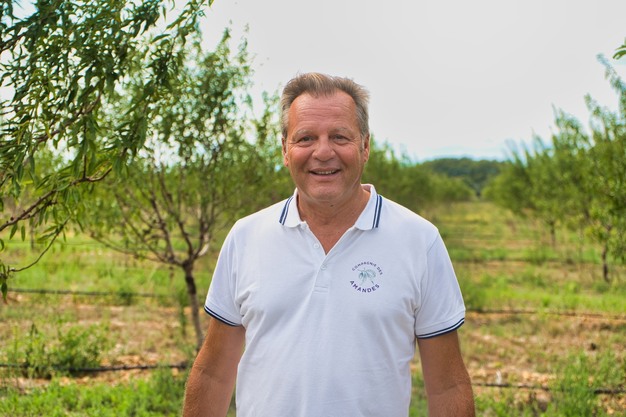
François Moulias - Photo credit: La Compagnie des Amandes
For more information:
François Moulias
La Compagnie des Amandes
contact@compagniedesamandes.com
www.compagniedesamandes.com
